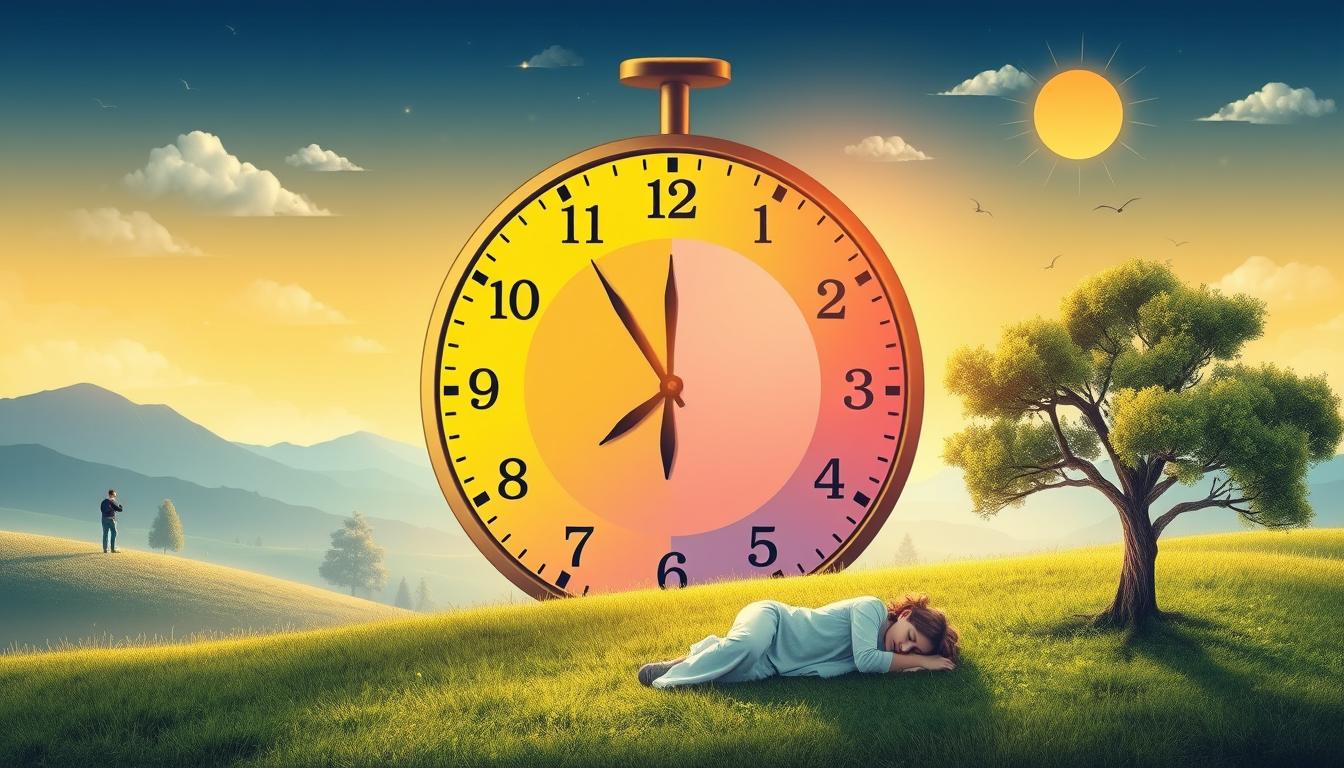Learning about my circadian rhythm is key to beating daytime fatigue and improving sleep. My body has natural cycles that control my energy. By matching my activities with these cycles, I can feel less tired.
Studies show that keeping a regular sleep schedule is vital for a healthy circadian rhythm.
In this article, I’ll talk about my battles with fatigue and how to manage my sleep. I hope my experiences help you see why knowing your circadian rhythm matters. It’s important for staying productive and feeling good.
Understanding My Circadian Rhythm
Circadian rhythms affect my daily life a lot. They influence my energy and sleep. Knowing about circadian rhythm helps me understand my body better.
What is Circadian Rhythm?
Circadian rhythms are 24-hour cycles that control our body’s functions. They help regulate sleep, hormone release, eating, and body temperature. Learning about circadian biology helps me manage my day better.
The Science Behind Circadian Rhythms
Light affects our circadian rhythms a lot. Daylight tells our body when to wake up or sleep. Keeping in sync with this rhythm is key for good health. Research shows that disrupting it can cause health problems.
How Circadian Rhythm Affects My Sleep
My lifestyle can clash with my biological clock, causing sleep issues. I see how my rhythm affects my sleep quality and wake-up feeling. Knowing my sleep cycles helps me plan my day for better energy and focus.

Recognizing the Signs of Daytime Fatigue
Knowing the signs of daytime fatigue is key to my health. By spotting these signs, I can see when my body needs help. Common signs include trouble focusing, feeling irritable, and a constant tiredness.
Common Symptoms I Experience
Daytime fatigue shows up in my daily life. Spotting these signs helps me know when to make changes. These signs include:
- Lack of focus on tasks
- Difficulty remembering details
- Increased moodiness or irritability
- Constant yawning or drowsiness
- Physical tiredness, even after enough sleep
Factors Contributing to Daytime Fatigue
Knowing what causes fatigue is important to fight daytime tiredness. Several factors can affect my energy, including:
- Poor sleep quality due to interruptions or discomfort
- High levels of stress impacting my mental state
- Nutritional deficiencies, such as insufficient iron or vitamins
- Lifestyle choices like sedentary behavior or excessive screen time

The Relationship Between Circadian Rhythm and Daytime Fatigue
Learning how my circadian rhythm affects my energy is key to fighting daily fatigue. Studies show a clear link between disrupted rhythms and my health. When my internal clock is off, I feel more tired, which hurts my work and mood.
How My Circadian Rhythm Impacts My Energy Levels
My energy depends a lot on a steady circadian rhythm. When it’s in sync with nature, I’m more alert during the day. But irregular sleep or work hours can mess with my sleep, making me tired all day. Knowing this helps me stay sharp and productive.
Identifying Disruptions in My Circadian Rhythm
Things like shift work, traveling, and changing sleep times can mess with my rhythm. These issues can cause long-term sleep problems, making me even more tired. Spotting these problems lets me plan better to match my natural rhythms. This helps me do better at work and feel better overall.

Strategies to Regulate My Circadian Rhythm
To fight daytime tiredness and match my sleep with my natural rhythm, I use several strategies. These methods improve my sleep quality and keep my energy up all day.
Establishing a Consistent Sleep Schedule
Setting a regular sleep schedule is crucial for me. The Sleep Foundation says it helps my body’s clock. This routine makes me wake up feeling fresh and ready for the day.
The Role of Light Exposure in Regulating My Rhythm
Light plays a big role in my rhythm. I get lots of natural light in the morning to stay alert. At night, I avoid artificial light, especially blue light from screens, to signal my body to relax.
Utilizing the Power of Naps
Short naps during the day are very helpful. Studies show they recharge my energy without messing with my night sleep. By timing my naps right, I stay focused and perform better throughout the day.

